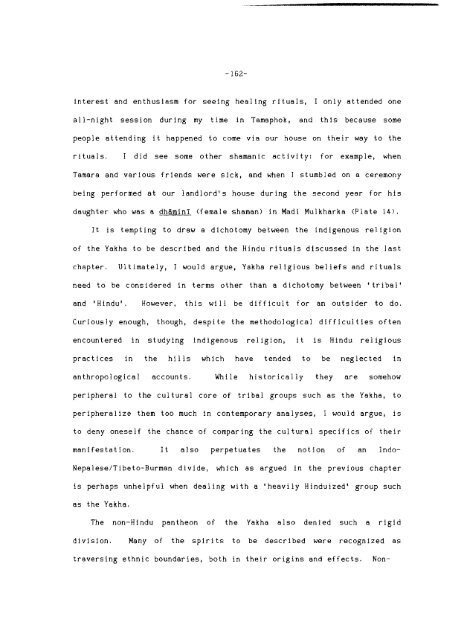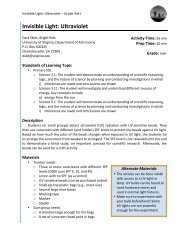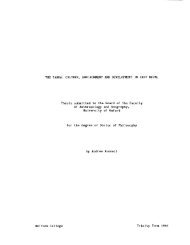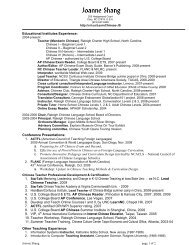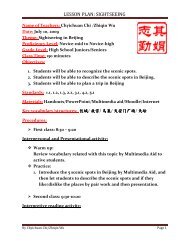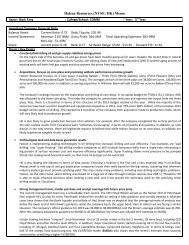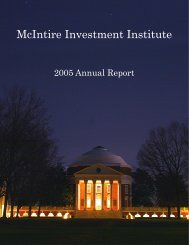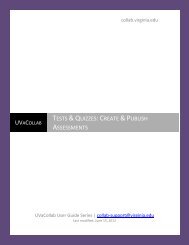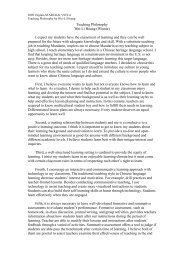- Page 1 and 2:
THE YAKHA: CULTURE, ENVIRONMENT AND
- Page 3 and 4:
Dedicated to the memory of MART IN
- Page 5 and 6:
Without the funding of the ESRC it
- Page 7 and 8:
CONTENTS CHAPTER ONE: Searching for
- Page 9 and 10:
CHAPTER SEVEN: Other Worlds: Inside
- Page 11 and 12:
List of Plates After Page P!ate 1:
- Page 13 and 14:
, Map I: Nepal, showing location of
- Page 15 and 16:
March 1989 and October 1990, in the
- Page 17 and 18:
to be social?", friends asked. "Enc
- Page 19 and 20:
people whom the project was designe
- Page 21 and 22:
was no reason why SEADD (who liked
- Page 23 and 24:
presence of institutions at the loc
- Page 25 and 26:
I did have the opportunity to under
- Page 27 and 28:
(Map 2). We decided to make Kathman
- Page 29 and 30:
felt I had scored a small victory o
- Page 31 and 32:
Chainpur (see Map 3). It was on the
- Page 33 and 34:
primary level teacher at the Tamaph
- Page 35 and 36:
quest ions concerned wi th language
- Page 37 and 38:
p 5: KHARDEP map of Tamaphok penchy
- Page 39 and 40:
to visit during the day. Our own da
- Page 41 and 42:
learn the Yakha language, our progr
- Page 43 and 44:
week into his palm to cover the ext
- Page 45 and 46:
make enquiries. I found out about a
- Page 47 and 48:
a research assistant after school.
- Page 49 and 50:
to collect a VSO (Voluntary Service
- Page 52 and 53:
towns). Demonstrations and strikes
- Page 54 and 55:
post-mortem exemfnations could be c
- Page 56 and 57:
Kathmandu and elsewhere, and there
- Page 58 and 59:
sending to Kathmandu, a lucky find
- Page 60 and 61:
Our return to Tamaphok after this w
- Page 62 and 63:
een his concern: ie there has been
- Page 64 and 65:
of the ncrude distinction between '
- Page 66 and 67:
with their environment' ) and ask w
- Page 68 and 69:
Notes: Chapter One 1. I should expl
- Page 70 and 71:
higher administrators in Europe, mi
- Page 72 and 73:
Chapter Two: Ecological Anthropolog
- Page 74 and 75:
despite long-term involvement in th
- Page 76 and 77:
This chapter looks at how many of t
- Page 78:
Poffenberger (1980) sees a direct a
- Page 81 and 82:
The major variable which Macfarlane
- Page 83 and 84:
the mindless instigators of denudat
- Page 85 and 86:
ather than regularities in the phen
- Page 87 and 88:
contradict ions" (Ellen, 1979b: 21,
- Page 89 and 90:
position which is too broad to be u
- Page 91 and 92:
Steward was predated by Meggers (19
- Page 93 and 94:
value of an ecosystemic approach in
- Page 95 and 96:
small population may be more adapti
- Page 97 and 98:
describes as ' mangeurs du bois' [e
- Page 99 and 100:
Rappaport thus argues for the need
- Page 101 and 102:
eing trivial and dealing only with
- Page 103 and 104:
What we have, then, is ecological a
- Page 105 and 106:
Others have suggested that there ma
- Page 107 and 108:
were unique is to deny an answer to
- Page 109 and 110:
1987:86>. Sometimes identity derive
- Page 111 and 112:
and funeral and other ritual obliga
- Page 113 and 114:
suggests. Varioari for the Yakha wo
- Page 115 and 116:
Plate 7: Yakha woman, Kami boy Plat
- Page 117 and 118:
Certainly Yakha identity, their sen
- Page 119 and 120:
Bahadur one day; "doesn't it smell
- Page 121 and 122:
inland, and came into contact with
- Page 123 and 124:
land amongst kinsmen and adjudicati
- Page 125 and 126:
part. We shall then go on to look a
- Page 127 and 128:
settlers was from a pattern of shif
- Page 129 and 130:
PanciWa t Ankhibhui Maml i ng Tamap
- Page 131 and 132:
At the local level, the figures for
- Page 133 and 134:
P6-c Khap~ar (1 it, 'Five Skulls' )
- Page 135 and 136: etween the two tribes were to be ta
- Page 137 and 138: greater extreme the Yakha of Kingri
- Page 139 and 140: People did not seem unduly perturbe
- Page 141 and 142: take food, and to whom one could gi
- Page 143 and 144: However, despite the influence of c
- Page 145 and 146: 1979:53). We were told of two other
- Page 148 and 149: circumspection, A particularly stro
- Page 150 and 151: striking in terms of the dichotomy
- Page 152 and 153: ut never eaten. It should be noted
- Page 154 and 155: Dasai-, TihBr, S8un San.krBnti, M B
- Page 156: splattered with whitewash, and it o
- Page 159 and 160: its scrupulous egalitarianism in ap
- Page 161 and 162: In preparation, a large square of c
- Page 163 and 164: practitioner) stepped forward and d
- Page 165 and 166: Tihtir, their distinctive smell bei
- Page 167 and 168: Plate 12: The predh6n v6-c gives Ti
- Page 169 and 170: marked, clockwise from top left, wi
- Page 171 and 172: e honoured, and proceeding through
- Page 173 and 174: would tend to make feeble excuses a
- Page 175 and 176: ice and dahi which had been the mar
- Page 177 and 178: also served. The house was speciall
- Page 179 and 180: there was no simple 'melting pot' a
- Page 181 and 182: not at the material level conceived
- Page 183 and 184: although it has been observed among
- Page 185: amongst the more sophisticated memb
- Page 189 and 190: ancestors since times immemorial1'
- Page 191 and 192: sammetlir) were only really used fo
- Page 193 and 194: deaths'). This did not appear to be
- Page 195 and 196: top of the bride's) were given a li
- Page 197 and 198: about a ceremony called tentamana.
- Page 199 and 200: elaborate all-night rituals, paid f
- Page 201 and 202: different remedies, For example, a
- Page 203 and 204: elow, 4.5 The Spirit Pantheon Perha
- Page 206 and 207: of these sorts of spirits were pokt
- Page 208 and 209: killed the elephant, cleared the ju
- Page 210 and 211: Wider-Ranging Spiri ts Some spirits
- Page 212 and 213: [cloth rags], Thokro [bamboo made i
- Page 214 and 215: this core has obviously been quite
- Page 216 and 217: Chapter Five: The Household Environ
- Page 218 and 219: p 7: The upper part of Tamphok Howe
- Page 220 and 221: Plate 18: Typical Yakha house Plate
- Page 222 and 223: omphu, but were expected to sit alo
- Page 224 and 225: apparatus for the production of mil
- Page 226 and 227: Plate 20: Terrace showin8 m, chicke
- Page 228 and 229: design was changing. Some new house
- Page 230 and 231: Fig. 5.3 Yakha Clans and Subdivisio
- Page 232 and 233: chor] . One interesting story indic
- Page 234 and 235: 1 q:a. 40. v ~ , ~ ~ ~ $ L , --- -T
- Page 236 and 237:
Re 1 a t i onsh i p Terms While per
- Page 238 and 239:
metaphorically when talking to anyo
- Page 240 and 241:
elative whose mother had been a rel
- Page 242 and 243:
a circle with two which were wider
- Page 244 and 245:
until he became too old to manage o
- Page 246 and 247:
woman from Terhathum district who h
- Page 248 and 249:
where a choice is shown, the higher
- Page 250 and 251:
when it came to the food commitment
- Page 252 and 253:
None of these potent ial sources of
- Page 254 and 255:
ing a nimto (an 'invitation' but al
- Page 256 and 257:
tended to use 1 ocal sources. The n
- Page 258 and 259:
to the mul-~har, The pigeons were u
- Page 260 and 261:
Chapter Six: The Natural Environmen
- Page 262 and 263:
Plate 22: Ghar-bar! and some of its
- Page 264 and 265:
acked spiders which had made their
- Page 266 and 267:
the lives of the Yakha, We saw in C
- Page 268 and 269:
allow the flow of water from one te
- Page 270 and 271:
P'"
- Page 272 and 273:
followed along at the edge of the c
- Page 274 and 275:
ye1 low or red and affected the dev
- Page 276 and 277:
large mats in the yard using a wood
- Page 278 and 279:
to profit directly from cardamom cu
- Page 280 and 281:
phuphu~arg, These were pop guns mad
- Page 282 and 283:
above were far from common. The las
- Page 284 and 285:
name for the animal, However, while
- Page 286 and 287:
There were various types of trees f
- Page 288 and 289:
to find out more about it, 1 wonder
- Page 290 and 291:
season. The first time we worked wi
- Page 292 and 293:
y its very name co-opted rice (epit
- Page 294 and 295:
spoke to put this down to our use o
- Page 296 and 297:
which people f rom Tamaphok maintai
- Page 298 and 299:
married into the Tamaphok Yakha com
- Page 300 and 301:
ten or twelve years (since the open
- Page 302 and 303:
a photo studio, a shoe shop, a bank
- Page 304 and 305:
they required, such as salt or kero
- Page 306 and 307:
Mamling, Ankhibhui and Dandagaon) m
- Page 308 and 309:
plans of the Congress party for the
- Page 310 and 311:
one could see numerous generally si
- Page 312 and 313:
afterwards, 'they' (meaning the Kir
- Page 314 and 315:
REi-ko could also mean torch. Fire,
- Page 316 and 317:
settlement and labour, In the men's
- Page 318 and 319:
economically important but constitu
- Page 320 and 321:
said a person was in 'Malaya' when
- Page 322 and 323:
they had compartmentalized their ex
- Page 324 and 325:
performing on the front porch. The
- Page 326 and 327:
meat and rice for the wedding pests
- Page 328 and 329:
owned by a Tibetan businessman, He
- Page 330 and 331:
Arabia (which left his impoverished
- Page 332 and 333:
the course of their healing work. T
- Page 334 and 335:
egards migration on a visit to the
- Page 336 and 337:
migration, Those villages and famil
- Page 338 and 339:
Chapter Eight: Outside-In: The Wide
- Page 340 and 341:
Tamaphok, although he himself admit
- Page 342 and 343:
were generally brought into Tarnaph
- Page 344 and 345:
having been established in Otemmato
- Page 346 and 347:
functions (such as the Bri tain-Nep
- Page 348 and 349:
the landscape. Kamala, his daughter
- Page 350 and 351:
we1 1 as the term 'Dewan' which, as
- Page 352 and 353:
people began drifting off and paid
- Page 354 and 355:
ela t i ves. The edilcat ional sys
- Page 356 and 357:
pradhan pa-c to attend meetings in
- Page 358 and 359:
healthy criticism of the national p
- Page 360 and 361:
increasingly short supply and this
- Page 362 and 363:
Political Eruptions and Social Rupt
- Page 364 and 365:
After that the new female teacher g
- Page 366 and 367:
silent in group situations, were hi
- Page 368 and 369:
challenged people's basic values an
- Page 370 and 371:
There was a!so evidence of new trad
- Page 372 and 373:
which we kept all our fieldnotes an
- Page 374 and 375:
(1987) because of the Limbu orthogr
- Page 376 and 377:
land to be made available for small
- Page 378 and 379:
much interaction between the centre
- Page 380 and 381:
in Kathmandu! . The woman who had b
- Page 382 and 383:
in Tamaphok did not seem to have he
- Page 384 and 385:
were certainly few constraints on e
- Page 386 and 387:
assistance for small-scale developm
- Page 388 and 389:
Conc 1 ud i ng Renar ks This study
- Page 390 and 391:
obset-ved. In such an analysis, the
- Page 392 and 393:
involves anthropologists with a bac
- Page 394 and 395:
Plate 34: Uttar Bahadur Magar and T
- Page 396 and 397:
anuncha aooteoba spa apum aphar) ap
- Page 398 and 399:
co, kma co'mma clkclki clkma cuhe c
- Page 400 and 401:
hamma hamma ki . wa hapma hawa ha *
- Page 402 and 403:
kumduna. kumduwa, kuna kuncakuba k
- Page 404 and 405:
mimik mimiya minuma mi. mi *ga buor
- Page 406 and 407:
0' i ocog- ohog @,hop olagdag olemp
- Page 408 and 409:
so.ri su-ha sumch i sumpak s upma t
- Page 410 and 411:
ye .kser) yemma YEPma yoon uma yo '
- Page 412 and 413:
Caste and clan of spouse Woman's na
- Page 414:
7B. Loans to others Is your family
- Page 418 and 419:
Aziz, B. 1986. Review of Fisher, 19
- Page 420 and 421:
Conklin, H. 1955, Hanunoo Color Cat
- Page 422:
Fisher, J.F. 1978, Homo Hierarchicu
- Page 425 and 426:
Jones, R, L. 1973. Kinship and Marr
- Page 427 and 428:
Miller, C, J, 1979. Faith Healers i
- Page 429 and 430:
Regmi, M. C. 1978, Land Tenure and
- Page 431 and 432:
Thompson, M,, M. Warburton and T. H


